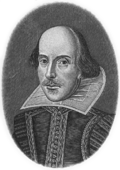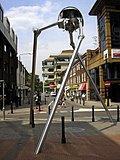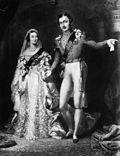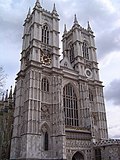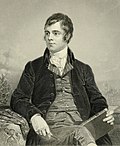Portal:United Kingdom
The United Kingdom Portal
 |
 |
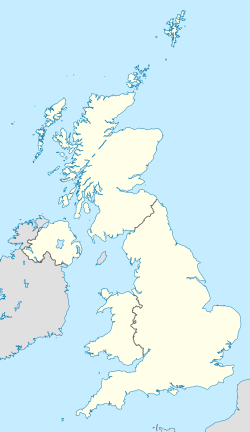
| |
The United Kingdom of Great Britain and Northern Ireland, commonly known as the United Kingdom (UK) or Britain, is a country in Northwestern Europe, off the coast of the continental mainland. It comprises England, Scotland, Wales and Northern Ireland. The UK includes the island of Great Britain, the north-eastern part of the island of Ireland, and most of the smaller islands within the British Isles, covering 94,354 square miles (244,376 km2). Northern Ireland shares a land border with the Republic of Ireland; otherwise, the UK is surrounded by the Atlantic Ocean, the North Sea, the English Channel, the Celtic Sea and the Irish Sea. It maintains sovereignty over the British Overseas Territories, which are located across various oceans and seas globally. The UK had an estimated population of over 68.2 million people in 2023. The capital and largest city of both England and the UK is London. The cities of Edinburgh, Cardiff and Belfast are the national capitals of Scotland, Wales and Northern Ireland respectively.
The UK has been inhabited continuously since the Neolithic. In AD 43 the Roman conquest of Britain began; the Roman departure was followed by Anglo-Saxon settlement. In 1066 the Normans conquered England. With the end of the Wars of the Roses the Kingdom of England stabilised and began to grow in power, resulting by the 16th century in the annexation of Wales and the establishment of the British Empire. Over the course of the 17th century the role of the British monarchy was reduced, particularly as a result of the English Civil War. In 1707 the Kingdom of England and the Kingdom of Scotland united under the Treaty of Union to create the Kingdom of Great Britain. In the Georgian era the office of prime minister became established. The Acts of Union 1800 incorporated the Kingdom of Ireland to create the United Kingdom of Great Britain and Ireland in 1801. Most of Ireland seceded from the UK in 1922 as the Irish Free State, and the Royal and Parliamentary Titles Act 1927 created the present United Kingdom.
The UK became the first industrialised country and was the world's foremost power for the majority of the 19th and early 20th centuries, particularly during the Pax Britannica between 1815 and 1914. The British Empire was the leading economic power for most of the 19th century, a position supported by its agricultural prosperity, its role as a dominant trading nation, a massive industrial capacity, significant technological achievements, and the rise of 19th-century London as the world's principal financial centre. At its height in the 1920s the empire encompassed almost a quarter of the world's landmass and population, and was the largest empire in history. However, its involvement in the First World War and the Second World War damaged Britain's economic power, and a global wave of decolonisation led to the independence of most British colonies. (Full article...)
Featured article
The Cleveland Street scandal occurred in 1889, when a homosexual male brothel in Cleveland Street, London, was uncovered by police. At the time, sexual acts between men were illegal in Britain, and the brothel's clients faced possible prosecution and certain social ostracism if discovered. It was rumoured that one of the brothel's clients was Prince Albert Victor, who was the son of the Prince of Wales and second-in-line to the British throne. Officials were involved in a cover-up to keep the prince's name and others' out of the scandal. One of the clients, Lord Arthur Somerset, was an equerry to the Prince of Wales but he, as well as the brothel keeper, Charles Hammond, managed to flee abroad before a prosecution could be brought. The rent boys, who also worked as messenger boys for the Post Office, were given light sentences and none of the clients were prosecuted. After Henry FitzRoy, Earl of Euston was named in the press as a client, he successfully sued for libel. The British press never named Prince Albert Victor, and there is no evidence he ever visited the brothel, but his inclusion in the rumours has coloured biographers' perceptions of him since. The scandal fuelled the attitude that male homosexuality was an aristocratic vice that corrupted lower-class youths. (Full article...)
Featured biography
Eric Havelock was a British classicist. He was a professor at the University of Toronto and was active in the academic wing of the Canadian socialist movement during the 1930s. In the 1960s and '70s, he served as chair of the classics departments at both Harvard and Yale. Although he was trained in the turn-of-the-century Oxbridge tradition of classical studies, which saw Greek intellectual history as an unbroken chain of related ideas, Havelock broke radically with his own teachers and proposed an entirely new model for understanding the classical world, based on a sharp division between literature of the 6th and 5th centuries BC on the one hand, and the 4th on the other. Much of Havelock's work was devoted to a single thesis: that all of Western thought is informed by a profound shift in the kinds of ideas available to the human mind at the point that Greek philosophy converted from an oral to a literate form. The idea has been controversial in classical studies, and has frequently been rejected outright; however, outside his own field, Havelock has been extraordinarily influential. He and Walter J. Ong essentially founded the amorphous field that studies transitions from orality to literacy, and Havelock has been one of the most frequently cited theorists in that field. (Full article...)
General images -
Subportals
WikiProjects
Things you can do
- Visit the British Wikipedians' notice board.
- The noticeboard is the central forum for information and discussion on editing related to the United Kingdom.
- Comment at the British deletion sorting page.
- This page lists deletion discussions on topics relating to the United Kingdom.
Featured pictures
Did you know -

- ... that Surinder Singh Bakhshi led the successful containment of smallpox in the community during Birmingham's smallpox outbreak in 1978?
- ... that Southern Water was fined £90 million for deliberately dumping sewage into the sea?
- ... that the Labour Party received their highest share of the vote to date in the 1951 UK general election but still lost to the Conservatives, who received fewer votes?
- ... that Ruth Northway is the United Kingdom's first professor of learning disability nursing?
- ... that Graham Fraser pioneered cochlear implantation in the United Kingdom?
- ... that Elizabeth II's childhood toys at 145 Piccadilly included 30 toy horses and a farm set collected from Woolworths?
In the news
- 29 July 2025 – 2025 New York Peace Conference on Gaza
- United Kingdom prime minister Keir Starmer declares that the UK will formally recognize the State of Palestine should a ceasefire not be achieved by September. (The Telegraph)
- 28 July 2025 –
- Two people are killed and two others are injured, including the perpetrator, in a mass stabbing on business premises on Long Lane in Southwark, London, United Kingdom. (Sky News)
- 25 July 2025 – Online Safety Act 2023
- Thousands of websites begin implementing age verification to block "adult content" for British viewers under the age of 18, according to Ofcom. (BBC News)
- 24 July 2025 – Hungary–Israel relations, Hungary–United Kingdom relations
- Hungary bans Irish rap trio Kneecap for three years ahead of a music festival, citing a national security threat over their alleged support for Hamas and Hezbollah. (The Times of Israel)
- 19 July 2025 –
- In boxing, Ukrainian Oleksandr Usyk defeats British challenger Daniel Dubois at Wembley Stadium in London, England, via a fifth-round knockout to become a two-time undisputed heavyweight champion. (BBC Sport)
- 17 July 2025 –
- The British government announces it will lower the voting age to 16, allowing 16- and 17-year-olds to vote in the upcoming general election. (NPR)
Categories
Other UK-connected Wikipedias
Wikimedia
The following Wikimedia Foundation sister projects provide more on this subject:
-
Commons
Free media repository -
Wikibooks
Free textbooks and manuals -
Wikidata
Free knowledge base -
Wikinews
Free-content news -
Wikiquote
Collection of quotations -
Wikisource
Free-content library -
Wikiversity
Free learning tools -
Wikivoyage
Free travel guide -
Wiktionary
Dictionary and thesaurus




